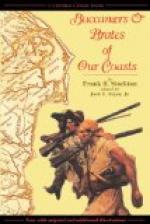This unfortunate result of the bold enterprise undertaken by Pierre Francois was deeply deplored, not only at Tortuga, but in England and in France. If this bold buccaneer had captured the pearl fleet, it would have been a victory that would have made a hero of him on each side of the Atlantic, but had he even been able to get away with the one vessel he had seized, he would have been a rich man, and might have retired to a life of ease and affluence; the vessel he had captured proved to be one of the richest laden of the whole fleet, and not only in the heart of Pierre and his men, but among his sympathizers in Europe and America, there was great disappointment at the loss of that mainmast, which, until it cracked, was carrying him forward to fame and fortune.
Chapter VI
The Surprising Adventures of Bartholemy Portuguez
As we have seen that the buccaneers were mainly English, French, and Dutch sailors, who were united to make a common piratical warfare upon the Spaniards in the West Indies, it may seem a little strange to find a man from Portugal who seemed to be on the wrong side of this peculiar fight which was going on in the new world between the sailors of Northern and Southern Europe. But although Portugal is such a close neighbor of Spain, the two countries have often been at war with each other, and their interests are by no means the same. The only advantage that Portugal could expect from the newly discovered treasures of the West were those which her seafaring men, acting with the seafaring men of other nations, should wrest from Spanish vessels homeward bound.
Consequently, there were Portuguese among the pirates of those days. Among these was a man named Bartholemy Portuguez, a famous flibustier.
It may be here remarked that the name of buccaneer was chiefly affected by the English adventurers on our coast, while the French members of the profession often preferred the name of “flibustier.” This word, which has since been corrupted into our familiar “filibuster,” is said to have been originally a corruption, being nothing more than the French method of pronouncing the word “freebooters,” which title had long been used for independent robbers.
Thus, although Bartholemy called himself a flibustier, he was really a buccaneer, and his name came to be known all over the Caribbean Sea. From the accounts we have of him it appears that he did not start out on his career of piracy as a poor man. He had some capital to invest in the business, and when he went over to the West Indies he took with him a small ship, armed with four small cannon, and manned by a crew of picked men, many of them no doubt professional robbers, and the others anxious for practice in this most alluring vocation, for the gold fields of California were never more attractive to the bold and hardy adventurers of our country, than were the gold fields of the sea to the buccaneers and flibustiers of the seventeenth century.




